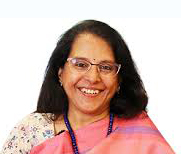
DR. MALINI SHANKAR
Vice Chancellor, Indian Maritime University Honorary Member, Board of Directors, World Maritime University
Dr. Malini V. Shankar is an accomplished civil servant and maritime policy leader, currently serving as the Vice Chancellor of the Indian Maritime University.
She holds a Master’s degree in Chemistry from Mount Holyoke College, Massachusetts, USA, and pursued professional mid-career training at the prestigious Institut international d'administration publique (IIAP) in Paris, France, where she earned a diploma in International Economics.
Dr. Shankar’s illustrious career includes serving as the Director General of Shipping, Government of India, at the rank of Secretary to the Government, where she was instrumental in advancing maritime safety, regulation, and training. In recognition of her contributions, she was nominated by the International Maritime Organization (IMO) as an Honorary Member of the Board of Directors of the World Maritime University.
She was recently honored as one of the seven global recipients of the AAA Award by the Asian Institute of Management (AIM), Manila—becoming the first Indian woman to receive this prestigious recognition.
Dr. Shankar continues to be a leading voice in maritime education and global maritime policy, committed to shaping the next generation of maritime professionals and advancing international cooperation.
